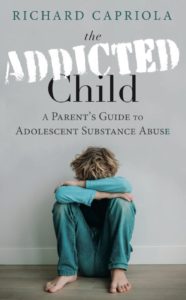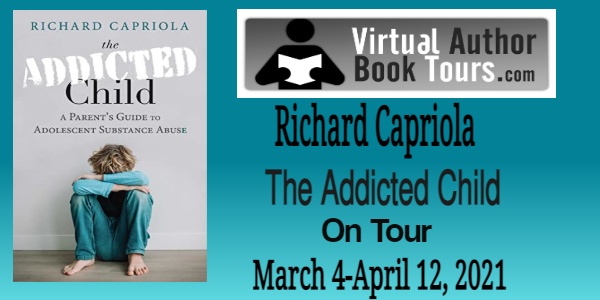
Description Addicted Child by Richard Capriola
The Addicted Child is a resource for parents. It addresses adolescent substance abuse. Readers learn the extent of adolescent substance abuse in America, how drugs impact the teen brain, warning signs every family should know about, assessments and tests important for a comprehensive assessment and diagnosis, how eating disorders and self-injury can accompany substance abuse, how to recognize street drugs being used by teens, and resources to help identify treatment options. Parents will learn from Richard Capriola, a mental health and addictions counselor, the importance of comprehensive assessments - and what to look for in a counselor to know you're getting the right help.Praise Addicted Child by Richard Capriola
Literary Titan Book Award (Gold) 2020 In this pragmatic and accessible text Rick Capriola has distilled the wisdom he accrued from decades of experience on the frontlines of substance use treatment. He provides a valuable resource to all parents attempting to find their bearings in the often confusing and frightening world of intertwined adolescent psychological and substance use problems.”-Major R. Bradshaw, Ph.D Department Of Psychiatry, Houston Methodist HospitalThe Addicted Child Excerpt
As the parent of an addicted child, feelings of helplessness, blame, and fear can drown out any sense of hope. If your child uses alcohol or drugs, you know firsthand how it affects your family. You may be carrying your child’s addiction on your own shoulders. You’ve cried and felt scared, wondering if today the drug would take your child forever. You might have been angry and asked, “How did I miss the warnings?” or wondered, “What did I do wrong?”
You love your child but, like one patient’s mother told me, you may feel overcome with fear. She sat across from me and through her tears, she cried, “I didn’t know what to do. I thought I was going to lose her.”
If addiction has plagued your family, you see up-close how alcohol and drugs invade your child’s brain and create abnormal behaviors. Angry outbursts. Defensiveness. Rebellion. When you try to control these behaviors, you set in motion a conflict that escalates the problem. So you establish strict rules, and when your child violates them, you punish the behavior. Soon you find yourself stuck in a cycle of control and out-of-control. It’s easy to become overwhelmed with the battle.
The majority of teens I treated used marijuana, usually multiple times a day. When asked why they used it, most said, “It helps my anxiety.” Their answer points to an important clue hidden below the surface of substance abuse: There could be an underlying reason why your child uses alcohol or drugs. It might be to relieve anxiety or depression. Perhaps it’s to avoid traumatic memories like bullying. It might be to cope with a psychological issue, such as post traumatic stress disorder, attention deficit disorder, or a personality disorder. While not every child using substances has an underlying psychological issue, for those that do, treating the alcohol or drug problem without treating the mental health issue behind it can be a treatment plan doomed to fail.
When you look beyond your child’s drinking or drug use, you may discover their struggle to manage intolerable thoughts, feelings, or memories is a core issue that requires treatment. However, you’re probably not equipped with the resources, training, or education to adequately do so. Therefore, it’s important that you insist on a comprehensive psychological and medical assessment before starting any treatment.
If you’ve been down this road, you might have already taken this step. Hearing the results of your child’s psychological assessment and diagnoses can be more difficult than hearing the details of their substance use. No parent wants to hear that their child is “broken.” You probably knew something about their alcohol or drug use, but the psychological findings can be shocking. Shattering. Confusing. Frightening.
I have sat in hundreds of diagnostic conferences when parents heard for the first time that their child has severe anxiety, major depression, or suffers from an emerging personality disorder or schizophrenia. Hearing these diagnoses is heartbreaking because parents usually see the substance abuse while completely unaware of the underlying mental health issues.
Your child may be creative at flying under the radar and discreetly hiding their substance use. The most frequent reaction I heard from parents was, “I had no idea this was going on!” Or if they suspected their child was using a substance, they were shocked at how extensive it was. Sometimes it was weekly use. Often it was daily.
There are important differences between adult and adolescent substance use disorders. Unlike the adult brain, your child’s brain is a work in process and reaches maturity in their mid-
twenties. Thus, introducing alcohol or drugs into their maturing brain puts your child at risk of developing a substance use disorder.
The consequences of substance use are another difference. Adults abusing substances often experience catastrophic consequences, such as losing a job or relationship. Many have been incarcerated. Adolescents, on the other hand, experience few consequences other than the threat of punishment from their parents, which often reinforces their substance use as a form of rebellion.
Richard Capriola has been an addictions counselor for over two decades. He has worked with adolescents and adults diagnosed with mental health and substance abuse issues. He is the author of The Addicted Child: A Parent’s Guide to Adolescent Substance Abuse which is available on Amazon and http://www.helptheaddictedchild.com
Addicted Child by Richard Capriola
Guest Review by Laura Lee
Unfortunately, it is becoming more and more common in our world to lose someone to drug addiction. So many of us have a family member who has become addicted to drugs, and, in some cases, even died from this addiction. Substance abuse issues and opioid deaths continue to skyrocket in this country every year.
When you bring a child into this world, you only want what is best for them and the thought that they might factor into those statistics is a scary thing. But, as a parent, you have to be prepared to help your child no matter what they are going through and this book, 'The Addicted Child: A Parent's Guide to Adolescent Substance Abuse,' by Richard Capriola is a great place to start.
This book is a comprehensive guide to seeking help for your substance abusing child. Everything from how to determine if your child really is addicted, to determining what they are addicted to and finally how exactly to get help for them is covered in a quick and easy format.
This book covers a lot in only seventeen chapters and does so in an academic way that is also accessible to anyone who is not familiar with the world of drugs and substance abuse. Richard Capriola is a substance abuse and mental health counselor, but his writing does not bog down the book with a lot of long-winded explanations or unintelligible words.
'The Addicted Child' is a simple, easy-to-understand resource for parents who may not have time to sort through a lot of information at once. Early in the book, Capriola insists that teenage drug use is not something that has to define your child's entire life. A sentiment that I'm sure many reading this book would appreciate and find comforting in their time of need.



Thanks so much for hosting!
ReplyDelete